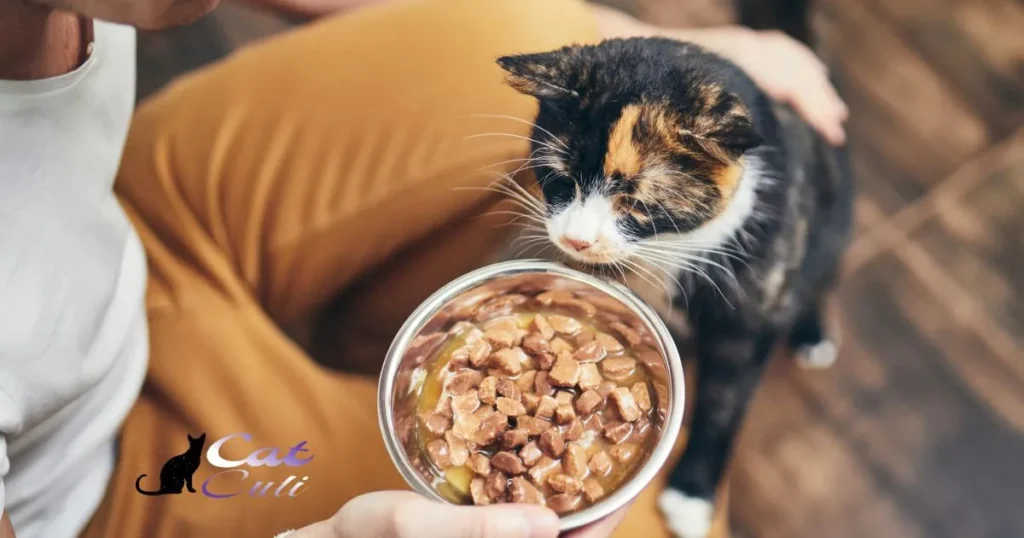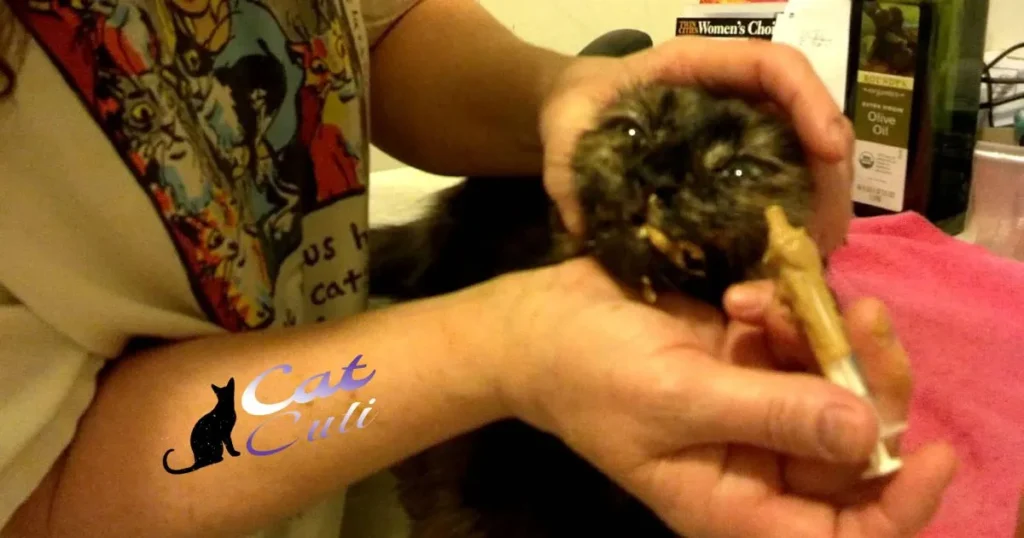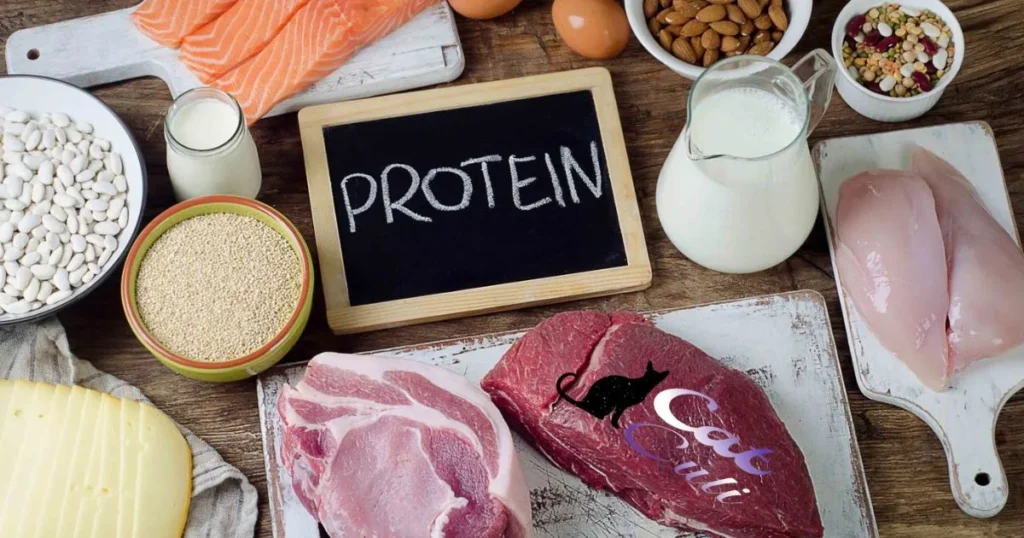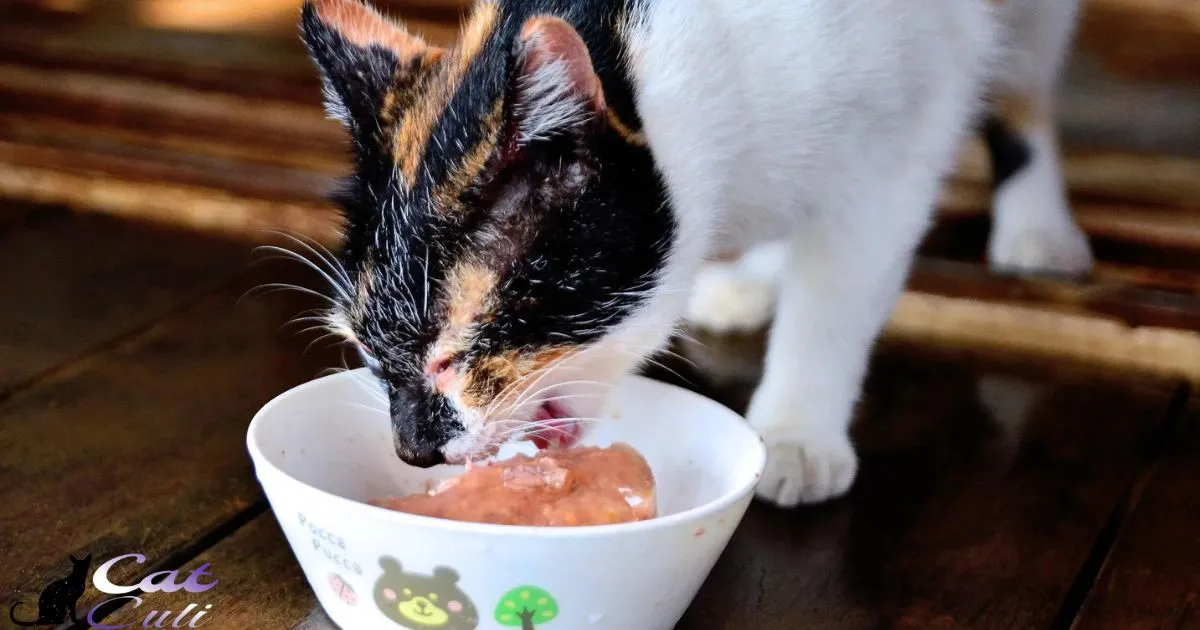Chickens should avoid canned cat food due to its unsuitable ingredients. This food’s high protein levels might harm their health. Opt for a balanced chicken diet instead to ensure their well-being. Avoiding cat food prevents potential health issues and keeps chickens healthy and thriving.
Ever wondered, Can chickens eat canned cat food? It’s a curious query that raises concerns about the dietary habits of our feathered friends. The answer, however, holds crucial implications for the well-being of these poultry pals. Delve into this intriguing question to uncover the secrets behind chicken nutrition.
Can Chickens Eat Canned Cat Food? explores the potential risks of feeding cat food to chickens. It’s important to understand the impact of such a diet on their health and wellbeing. Stick around to discover why it’s crucial to offer chickens a diet tailored to their specific nutritional needs.
Can Chickens Eat Cat Food?
Chickens should not eat cat food due to its unsuitable ingredients. Cat food contains high levels of protein that can harm chickens’ health. Feeding chickens a balanced diet formulated for their nutritional needs is crucial for their well-being. Stick to foods specifically designed for chickens to keep them healthy and thriving.
It’s important to avoid giving chickens cat food as it can lead to health issues. Cat food lacks the necessary nutrients chickens require and may cause digestive problems. Opt for a diet tailored to chickens to ensure they receive the right nutrition, supporting their overall health and vitality.
What Excess Protein Can Do To Chickens
Excessive protein can harm chickens. It leads to health issues like kidney damage and gout. Too much protein in their diet can strain their bodies, causing severe health complications. Chickens need a balanced diet for optimal health, avoiding excessive protein is vital to their well-being.
High protein diets cause problems for chickens. These include kidney damage and gout. Their bodies struggle to handle excessive protein, impacting their health. To keep chickens healthy, maintaining a balanced diet without too much protein is essential.
When Cat Food Is Okay For Chickens
Cat food can be alright for chickens occasionally. It’s crucial to offer it in moderation and as a supplement, not a primary diet. Certain cat food types might contain suitable proteins and nutrients, but always consult a vet or poultry expert before introducing it to ensure it complements their regular feed.
Timing matters. If you’re considering giving cat food to chickens, understanding when and how to offer it is key. Reserve it for special situations or as a temporary fix, ensuring it doesn’t replace their essential feed. Monitoring their health and behaviour after introducing cat food helps gauge its suitability for their diet.
Can Chickens Eat Wet Cat Food?
Chickens should not consume wet cat food due to its ingredients that aren’t suitable for their digestive systems. The high protein content might pose health risks to chickens. Feeding chickens a diet formulated for their nutritional needs ensures their well-being and optimal health.
Wet cat food isn’t appropriate for chickens as it contains ingredients unsuitable for their digestion. High protein levels in this food could potentially harm chickens’ health. Providing chickens with a diet tailored to their specific dietary requirements helps maintain their health and ensures they thrive.
Can Chickens Eat Dry Cat Food?
Chickens Eat Hard Cat Food should never be part of a chicken’s diet. The composition of dry cat food, with its high protein content and other components, is unsuitable for chickens. Introducing a diet meant for cats to chickens could result in health problems and disrupt their nutritional balance.
It’s essential to provide chickens with food designed specifically for their dietary requirements to maintain their health and well-being.When considering what to feed chickens, it’s crucial to avoid offering them dry cat food. This food isn’t formulated for poultry and may cause digestive problems due to its high protein content.
To ensure chickens stay healthy and thrive, it’s best to stick to a diet tailored to their nutritional needs, preventing potential health complications that might arise from consuming cat food.
Is Dry Cat Food Better Than Wet Cat Food For Chickens?

Dry cat food might seem convenient, but it may not be the best choice for chickens. Wet cat food, although messier, tends to contain more moisture, which can be beneficial for chickens, especially in hot weather.
Chickens thrive on a balanced diet, so considering their specific needs is crucial when deciding between dry and wet cat food.When comparing dry versus wet cat food for chickens, the moisture content becomes a pivotal factor. Dry food lacks hydration, potentially causing dehydration in chickens.
On the contrary, wet cat food offers more moisture, aiding in hydration and potentially contributing to a more balanced diet for these feathered creatures. Understanding these differences helps make an informed choice for the well-being of chickens.
15 Types Of Proteinous Foods Chickens Can Eat
| Type of Proteinous Food | Description |
| Mealworms | High-protein insect larvae beneficial for chickens |
| Crickets | Nutrient-rich insects suitable as chicken feed |
| Black Soldier Fly Larvae | Protein-packed larvae often used in chicken diets |
| Earthworms | Natural source of protein and nutrients for chickens |
| Fish | Cooked or canned fish can offer protein to chickens |
| Scrambled Eggs | Cooked eggs are a protein-rich treat for chickens |
| Soybeans | Protein-dense legume suitable when properly prepared |
| Peanuts | Rich in protein, but feed in moderation to chickens |
| Quinoa | Cooked quinoa provides a protein boost for chickens |
| Pumpkin Seeds | Nutritious seeds offering protein to chickens |
| Sunflower Seeds | Protein-rich seeds, a favorite among chickens |
| Lentils | Cooked lentils can serve as a protein source |
| Cheese | Small amounts of cheese can offer protein to chickens |
| Greek Yoghourt | Plain, unsweetened yoghourt is a protein-rich treat |
| Meal Replacement Pellets | Specifically formulated protein pellets for chickens |
What Kind Of Cat Food Should I Feed My Chicken?
When choosing cat food for your chickens, opt for a high-quality dry or canned variety. Look for formulas with a high protein content, avoiding those with artificial additives or excessive fillers. Ensure the cat food contains essential nutrients like amino acids crucial for chicken health.
When selecting cat food for chickens, prioritize quality dry or canned options with high protein and no artificial additives. Seek formulas rich in vital nutrients like amino acids, pivotal for chicken well-being. It’s wise to consult a vet for advice on the most suitable cat food to keep your feathered companions healthy and thriving.
What Nutrients Do Chickens Require For Healthy Growth?
Chickens need various nutrients for healthy growth. They require a balanced diet rich in protein, vitamins, and minerals. Protein aids in muscle development, while vitamins and minerals support their overall health. Providing these nutrients ensures robust growth and vitality in chickens.
A diverse diet is key to meeting a chicken’s nutritional needs. Protein sources like grains and insects are essential for muscle and feather development. Vitamins like A, D, and E, alongside minerals such as calcium and phosphorus, promote strong bones and egg production.
How Is Cat Food Different To Chicken Feed
| Aspect | Cat Food | Chicken Feed |
| Protein Content | Higher protein content, usually from animal sources | Varied protein sources like grains, seeds, insects |
| Nutrient Composition | Tailored for cats’ specific dietary needs | Tailored for chickens’ nutritional requirements |
| Additives | May contain additives for feline health | Specific additives to enhance egg production, immunity |
| Texture | Often wet or semi-moist | Usually dry, available in pellets or crumbles |
| Purpose | Meant to meet the nutritional needs of cats | Formulated to meet chickens’ growth and egg-laying needs |
Can Chickens Get Sick From Cat Food?

Chickens might get sick if they eat cat food. Cat food contains high levels of protein that can be harmful to chickens. Feeding them cat food might lead to digestive issues or other health problems. It’s best to stick to a proper chicken diet to keep them healthy and thriving.
Ensuring chickens don’t consume cat food is essential. Cat food isn’t formulated for their dietary needs. Feeding chickens cat food might result in illnesses due to the ingredients not suitable for their digestive systems. Preventing access to cat food helps safeguard the health of your feathered companions.
Can Chickens Live On Cat Food Only?
Chickens cannot thrive solely on cat food. Cat food lacks vital nutrients essential for chickens’ health. A diet solely of cat food deprives chickens of necessary proteins and grains. It’s crucial to provide chickens with a balanced diet comprising grains, seeds, insects, and poultry feed for their optimal health and wellbeing.
Feeding chickens only cat food is not recommended. It lacks the nutrients crucial for chickens to stay healthy. A diet solely of cat food can lead to deficiencies and health issues in chickens. Ensuring a varied diet, including poultry feed and appropriate grains, is essential for their overall well-being and proper growth.
Wet Vs Dry Cat Food Which Is Best For Chickens?
| Criteria | Wet Cat Food | Dry Cat Food |
| Nutritional Content | Contains higher moisture content | Lower moisture content |
| Nutrient Density | Generally lower in nutrients | Concentrated nutrients |
| Texture | Soft, moist texture | Hard, crunchy texture |
| Feeding Convenience | Spoils quicker, requires storage | Longer shelf life, easy to store |
| Suitability for Chickens | Not ideal due to moisture content and lower nutrient density | More suitable due to concentrated nutrients and longer shelf life |
Is Cat Food Safe For Chickens?
Cat food isn’t safe for chickens. It contains high protein levels that might harm them. Chickens need a different diet tailored to their specific nutritional needs for their safety and well-being. Providing them with proper chicken feed ensures their health remains optimal.
Ensuring chicken safety means avoiding feeding them cat food. The high protein content in cat food can pose health risks for chickens. Opting for a suitable diet designed for chickens helps maintain their safety and overall health, ensuring they thrive and stay in top condition.
Is Cat Food For Moulting Chickens Good?
Cat food for moulting chickens might seem convenient, but it isn’t ideal. Feathers need protein for regrowth, but cat food often lacks essential nutrients chickens need during this phase. Opting for a specialized poultry feed ensures chickens get the right nutrients to support healthy feather growth during moulting.
Feathers play a crucial role in a chicken’s health, especially during moulting. Using cat food might not provide the specific nutrients these birds require for optimal feather regeneration. Choosing a dedicated feed formulated for moulting chickens better supports their feather regrowth and overall well-being.
Can Chickens Eat Cat Biscuits?
Chickens should not eat cat biscuits as they’re formulated for feline nutritional requirements. Feeding these to chickens can lead to imbalances in their diet, impacting their health. Stick to a well-suited chicken diet to ensure their optimal nutrition and well-being, avoiding potential health risks associated with inappropriate food choices.
Cat biscuits contain ingredients tailored to cats’ dietary needs, not suitable for chickens. Offering chickens their specific feed is crucial for maintaining their health and ensuring they receive the right nutrients. Avoiding cat biscuits prevents potential health issues and supports chickens in thriving with a diet tailored to their requirements.
What Are People Saying About Their Chickens And Dry Cat Food?
People share varied opinions on feeding dry cat food to chickens. Some believe it offers extra protein, while others caution against potential health risks. Many suggest consulting a vet before introducing cat food to ensure it aligns with the chickens’ nutritional requirements.
Those who endorse feeding dry cat food to chickens often highlight its convenience and cost-effectiveness. However, concerns about the high protein content and additives in cat food lead others to emphasize the importance of a balanced chicken-specific diet for optimal health.
Types Of Chicken Breeds
- Popular breeds: Rhode Island Red, Leghorn, Plymouth Rock, and Orpington.
- Egg-layers: Breeds like Leghorns are prolific egg producers.
- Dual-purpose breeds: Buff Orpingtons and Rhode Island Reds excel in both eggs and meat.
- Fancy breeds: Silkie chickens are known for their fluffy feathers.
- Bantam breeds: Miniature versions of larger breeds, like the Bantam Plymouth Rock.
- Cold-hardy breeds: Some, like the Chantecler, thrive in colder climates.
- Exotic breeds: Ayam Cemani, known for their all-black appearance, are highly sought after.
When Should I Offer Protein Snack To Chickens

Chickens benefit from protein snacks when they’re moulting or during colder months. Feathers require protein for growth, so during moulting, treats like mealworms or seeds aid in feather regeneration. In colder weather, extra protein helps maintain their energy and body warmth.
Offering these snacks during these times supports their overall health and comfort.It’s ideal to offer protein snacks to chickens when they display signs of moulting or during winter. These snacks, like mealworms or seeds, supply essential protein for feather regrowth and energy.
In colder months, this additional protein helps chickens stay warm and maintain their vigour. Providing these snacks at the right times ensures chickens receive the necessary nutrients for their well-being.
Why Do Chickens Need Extra Protein
Chickens need extra protein for various reasons. It supports their growth, feather development, and overall health. Protein aids in producing strong eggshells and helps them recover from stress or illness faster. Ensuring chickens get adequate protein in their diet is essential for their vitality and productivity.
Without sufficient protein, chickens might face stunted growth and weak feathering. They could also lay eggs with fragile shells, leading to health issues. Providing them with the necessary protein ensures their bodies can function optimally, promoting healthier and more robust chickens overall.
How Much Protein Does My Chicken Need
Chickens require around 16% to 20% protein in their diet to stay healthy and lay eggs regularly. Protein helps in feather growth, egg production, and overall body development. Offering a balanced diet with proper protein levels ensures your chickens stay robust and productive.
Knowing your chicken’s protein needs is crucial for their health. Adjust their diet to include protein-rich feeds like soybeans, fishmeal, or mealworms to meet their nutritional requirements. Monitoring their protein intake ensures they lead a vibrant and active life, benefiting both their health and egg-laying capabilities.
Can Chickens Eat Hard Cat Food
Chickens should not consume hard cat food. This food lacks nutrients suitable for chickens. Feeding them cat food might lead to health issues. Stick to a balanced diet specifically designed for chickens to ensure their well-being.
Hard cat food isn’t appropriate for chickens. It doesn’t offer the essential nutrients these birds require. Feeding chickens cat food could result in potential health problems. Opt for a proper chicken diet to maintain their health and vitality.
Can Chickens Eat Cat Food Or Dog Food
Chickens should not consume cat or dog food as it lacks the nutrients essential for their health. These foods contain high levels of protein and other ingredients unsuitable for chickens. Feeding them such diets can lead to health complications and deficiencies.
Always provide chickens with a balanced diet formulated for their specific nutritional requirements to keep them healthy and thriving.Offering chickens a diet consisting of grains, vegetables, and specially formulated poultry feed is crucial.
Cat and dog food don’t meet their dietary needs, potentially causing digestive issues and nutrient imbalances. Ensuring chickens receive the right nutrients from their food helps maintain their overall health and supports egg production in laying hens. Stick to a well-rounded chicken diet to keep them happy and healthy.
Can Chickens Eat Tuna
Chickens can eat tuna, but it should be in moderation. Tuna provides protein and nutrients for chickens. Excessive consumption might lead to health issues. Introduce tuna occasionally as a treat within their balanced diet to ensure their well-being.
Offering tuna to chickens requires caution. It’s a good protein source, yet too much can cause harm. Incorporate it sparingly into their diet regimen for optimal health benefits without risking any adverse effects.
FAQ’s
Is it okay for chickens to eat cat food?
No, it’s not advisable. Cat food isn’t suitable for chickens; it lacks essential nutrients for their health.
Can chickens eat wet food?
Yes, they can. Wet food can be given occasionally, but a balanced diet primarily consists of grains and pellets.
What is the best source of protein for chickens?
Sources like mealworms, insects, or high-protein feed offer the best protein for chicken diets.
Do chickens eat canned fish?
Yes, they can. Canned fish, like tuna, can be fed occasionally, providing protein. Moderation is key for their diet.
Conclusion
In summary, the question Can Chickens Eat Canned Cat Food? raises concerns about the suitability of this diet for chickens. However, it’s generally advised against feeding them cat food due to its lack of essential nutrients tailored for poultry.
The high protein content and ingredients in cat food might not align with chickens’ nutritional requirements, potentially leading to health issues if regularly consumed. Instead, focusing on a balanced diet rich in grains, pellets, and specific protein sources ensures chickens thrive without the risks associated with cat food.








